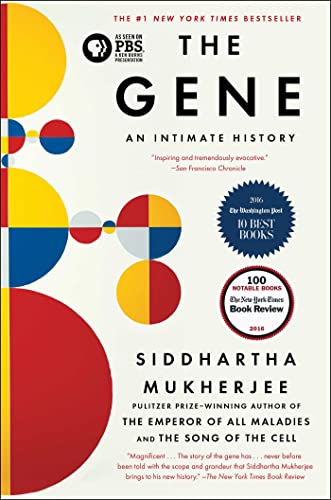
He is sometimes referred to as the father of modern genetics.

For years, he kept intricate records and accumulated mounds of data from which he ultimately identified units of heredity based primarily on his study of peas. Hence, the term bloodline that still is used today.Ĭenturies later, Gregor Mendel, the renowned botanist and monk forbidden to experiment on mice, instead turned to the gardens of the abbey. Around 350 B.C., he proposed that men and women carried their likeness in their blood. Aristotle was among the first to present theories.

Though not a light read, The Gene is captivating nonetheless.Ĭovering centuries of scientific questioning, research and hypothesizing, Mukherjee guides the reader on a compelling and sometimes sobering journey carefully explaining how humans slowly came to understand the complex role of genes in determining who we are.Īs Mukherjee reminds us, from the beginning of human history, people have wondered how traits of likeness are passed on from parents to children. I’m not sure how much actual information I retain, but who cares? Having this resource to refer back to is what matters. Let’s just say, it covers a lot of ground. In some ways, it reads like a biology or genetics text book. I’m not gonna lie, this book is not a light read. There is also a helpful glossary, timeline, notes section, extensive bibliography and index. Part Five: Through the Looking Glass (2001-2015). Part Four: “The Proper Study of Mankind Is Man” (1970-2005). Part Three: “The Dreams of Geneticists” (1970-2001).

Part Two: “In the Sum of the Parts, There Are Only the Parts” 1930-1970. Part One: The “Missing Science of Heredity” 1865-1935. The Gene begins with a compelling Prologue: Families. Now I want to tell you, my Dear Readers, a little bit about it.įirst, I’ll tell you about the book’s layout: (Is yours?)īut I was determined to make my way through it, and I did. More to the point, my concentration ability isn’t what it was prior to cancer. Reading this book was no small undertaking due to the book’s subject matter, detail and length. This book is for anyone wanting to understand more about the secrets of DNA and how the science of genetics came to be. However, this book is not just for those impacted by hereditary illnesses. I decided sharing a few thoughts about The Gene would be especially fitting with HBOC (Hereditary Breast and Ovarian Cancer) Week coming up next week. The Gene will be presented as a three-hour Ken Burns – Siddhartha Mukherjee collaborated documentary film on PBS as well in spring of 2020.

The book and the documentary are both very well done. You can read my review of that four-part television series here. The latter was made into a PBS documentary. Most of us in Cancer Land are familiar with Mukherjee’s acclaimed 2011 Pulitzer prize-winning book, The Emperor of All Maladies. Recently, I finished reading The Gene: An Intimate History by Siddhartha Mukherjee, MD.


 0 kommentar(er)
0 kommentar(er)
